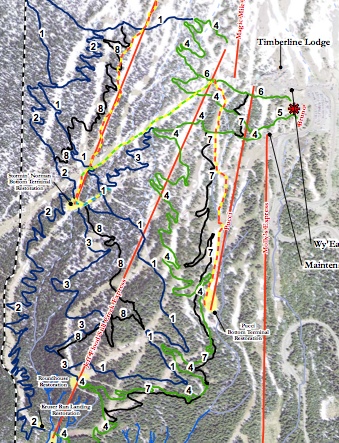
A 2011 map created by Timberline of the proposed bike trails and chair-lifts.
A plan to create a full-service, lift-assisted mountain bike park on the western slope of Mt. Hood got a boost last week when United States District Court Judge Ann Aiken denied a motion by three nonprofit groups who aim to stop it.
Judge Aiken’s 21-page opinion (see it below) signed on March 31st denies a Motion for Reconsideration filed by four plaintiffs: Bark, Friends of Mount Hood, Northwest Environmental Defense Center, and Sierra Club. The defendants on the case were the U.S. Forest Service, three regional forest staffers, and the National Marine Fisheries Service.
The conservation groups have made several attempts to derail this project through the courts and this is just the latest judgment to go against them.
After the USFS issued a “Finding of No Significant Impact” with their 2012 permit approval, the nonprofits filed a complaint in May 2013 seeking judicial review of that decision. The groups alleged that the USFS has failed in their duty to uphold the National Environmental Policy Act (NEPA) and that more rigorous environmental analysis was required. In August 2013, a conservation group discovered the presence of Western bumblebees in the project area. USFS biologists analyzed that finding and determined the project, “may impact individual bees or habitat but will not likely contribute to a trend toward federal listing or loss of viability of the population or species.” Shortly thereafter, the plaintiffs filed another lawsuit7 saying that the USFS failed to perform additional environmental analysis on bumblebee populations and on steelhead.
“I find that the arguments raised by plaintiff are repetitive of those previously raised in the last round of summary judgment motions.”
— Judge Ann Aiken, US District Court
In August 2014 the National Marine Fisheries Service concluded that the project would not adversely impact steelhead populations or their habitat; but they also ordered modifications to the project to ensure protection of individual steelhead.
After the USFS analyzed measures to protect steelhead in September 2014, they again said no supplemental NEPA analysis was required. Two months later, the plaintiffs filed a second complaint alleging those findings by the USFS were “abritary and capricious” and that more analysis on bumblebee and steelhead populations must be performed. In March 2016 Judge Aiken ruled in favor of the defendants.
In the intervening years Timberline had already begun several large restoration projects which had been approved to go forward even while the injunction against new biking trails was in effect. When more acreage than expected had been disturbed during those projects, the USFS once again analyzed the impact to steelhead populations and found it, “would not jeopardize their continued existence.” The plaintiffs argued that the restoration projects themselves constituted “significant new information” that should trigger a supplemental NEPA analysis. In December 2016 the USFS disagreed with them. In January 2017 the plaintiffs filed another complaint (their third) to challenge the USFS’s assertion yet again.
The legal details get complicated; but the arguments essentially boiled down to this: The plaintiffs felt that findings of impacts to bumblebee habitat and steelhead populations warranted additional environmental analysis. The plaintiffs also felt that restoration work in the project in the past few years has had a large enough impact to trigger more analysis. Furthermore, the plaintiffs complain that the USFS had failed to follow federal law. The USFS says they’ve done all the analysis required by law and that more analysis is not needed.
For instance, in her opinion, Judge Aiken cites the work of a USFS biologist hired to survey bumblebee populations. “The biologist noted that the project would not impact known bee foraging locations,” she writes. “The report also stated that the documented bee sites are adjacent to roads and near the Timberline Lodge, where there is already heavy human presence.”
Judge Aiken supports the USFS and wrote in her opinion, “In the present case, the Forest Service did not provide inaccurate or misleading information in the environmental assessment.” The plaintiff also failed to prove that the USFS decisions were “arbitrary and capricious.”
In her conclusion, the Judge writes:
“Plaintiffs argue that the motion should be granted because there is new evidence in this case and because I committed clear error of law. However, I find that the arguments raised by plaintiff are repetitive of those previously raised in the last round of summary judgment motions. None of those arguments… persuades me that my initial ruling was incorrect or contrary to law. Thus, I deny the motion for reconsideration… Accordingly, this case is dismissed.”
The Timberline MTB Park was first announced eight years ago. The U.S. Forest Service approved permits for the project at the end of 2012.
We’ve reached out to all parties in the lawsuit and will update this post as we hear back.
Below is Judge Aiken’s opinion and order signed 3/31:
TIMBERLINE-judgement— Jonathan Maus: (503) 706-8804, @jonathan_maus on Twitter and jonathan@bikeportland.org
Never miss a story. Sign-up for the daily BP Headlines email.
BikePortland needs your support.
The post Judge denies motion of conservation groups trying to stop Timberline MTB Park appeared first on BikePortland.org.
from Latest headlines from BikePortland https://ift.tt/2GLzacz


No comments:
Post a Comment